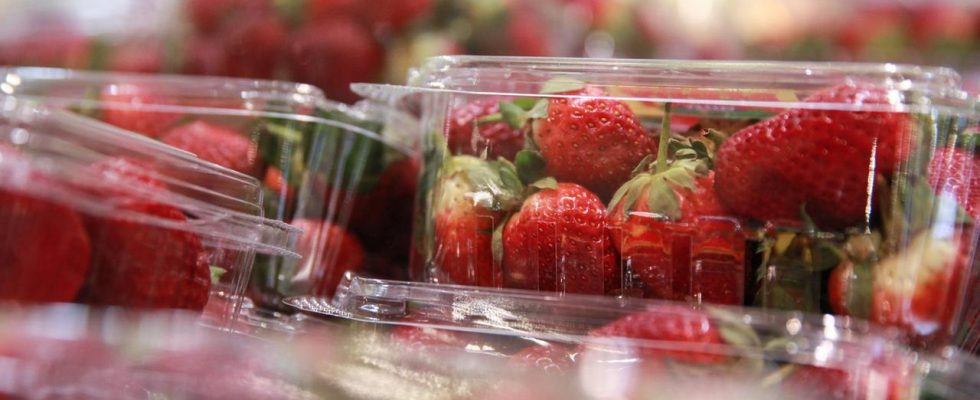The EU is declaring war on single-use plastic: from 2030, all packaging should be recyclable. There should no longer be many small packages such as ketchup sachets. The EU will also rely on reusable systems in the future.
The ketchup with the fries, the shampoo in the hotel, the pre-cut fruit in the supermarket – all of this will have to do without single-use plastic packaging in the future. From 2030, all packaging in the EU should be recyclable – with a few exceptions, such as medication packaging. The corresponding law was passed by a majority of members of the EU Parliament.
Untreated fruit and vegetables weighing less than one and a half kilograms will no longer be allowed to be available in a plastic wrapper. Further examples: the plastic carrier bags in the supermarket are no longer used and at the airport no suitcase or bag may be wrapped in plastic for transport.
Exceptions for medical products and Camembert
Exceptions to the ban should apply to medical products. Another exception is mainly due to resistance from France. It was about the traditional wooden boxes in which Camembert is sold. An exception will now also apply to packaging made of wood and wax.
The new decision also does not apply to paper packaging. This means that sugar and pepper, for example, can also be packaged in small paper bags in the future.
The EU is relying on reusable products
In order to promote recycling and reduce the amount of packaging waste, all EU members should switch to reusable systems by 2030 – i.e. to processes similar to those that are already common in Germany for returnable bottles. The packaging industry should comply with mandatory reusable quotas in the future. In the beverage sector, up to five companies can join forces to achieve the goals together.
Another point of the EU decision: In the future, food packaging will no longer be allowed to contain so-called permanent chemicals, which are particularly long-lasting and are considered harmful to health. These include so-called PFAS – i.e. per- and polyfluorinated alkyl substances – or bisphenol A, which the WHO, among others, attributes to hormone-like effects. The substances are often used to make paper and cardboard food packaging fireproof or waterproof.
Although it will take some time for the regulations to take effect, Frédérique Ries, lead negotiator for the EU Parliament, is already talking about a “big victory for the health of consumers”.
On average 190 kilos per EU citizen per year
By banning single-use plastic in packaging, the EU wants to get closer to its goal of saving at least 15 percent of packaging waste by 2040 – compared to the baseline value from 2018.
After all, every citizen in the EU produces an average of 190 kilograms of packaging waste per year. According to experts, without additional measures, the number could rise to more than 200 kilograms by 2030.
The Germans are even above this average value: In the Federal Republic, an average of around 225 kilograms of packaging waste is generated per inhabitant every year.
With information from Paul Vorreiter, ARD Brussels
Paul Vorreiter, ARD Brussels, tagesschau, April 24, 2024 2:39 p.m

